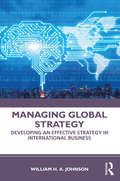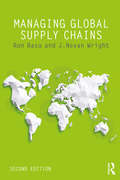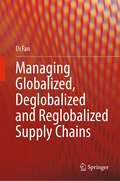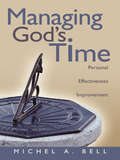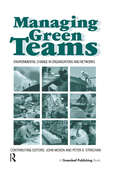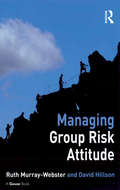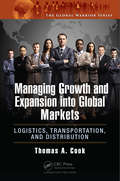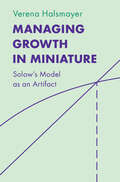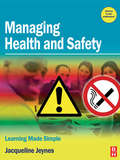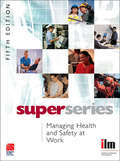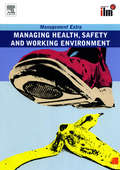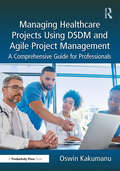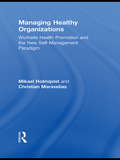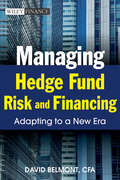- Table View
- List View
Managing Global Innovation 7. Collaborative Innovation
by Keeley Wilson Yves L. DozManaging Global Innovation is an 8-chapter book written by Yves L. Doz and Keeley Wilson of INSEAD and published in 2012 by Harvard Business Review Press. In today's global economy, existing knowledge is the catalyst for innovation, but gathering and using this knowledge depends on global factors which can create barriers to access. The authors provide a practical framework for the successful management of knowledge and innovation by optimizing the "innovation footprint," a framework designed to improve communication and receptivity and facilitate collaboration. The book is divided into four parts that address both theory and practice at each stage of the framework as well as the inherent challenges to innovation. The authors' detailed, practical guide for building and leveraging a global innovation network is based on extensive field research conducted worldwide. Chapter 7, Collaborative Innovation (30 pages), addresses the strategy of working with a local partner instead of creating a local presence. First, the authors discuss the differences in collaborating throughout each phase of the global project life cycle. In describing the identification phase, the authors identify factors to consider when choosing a partner. Next, they explain why a more closed approach is appropriate for the definition and delivery phases and discuss critical partnership issues. Last, he authors explore a fourth phase of the project life cycle which involves the distribution or diffusion of the innovation. Real-world examples include IMB, Boeing, and Intel.
Managing Global Innovation 8. Globally Integrated Innovation
by Keeley Wilson Yves L. DozManaging Global Innovation is an 8-chapter book written by Yves L. Doz and Keeley Wilson of INSEAD and published in 2012 by Harvard Business Review Press. In today's global economy, existing knowledge is the catalyst for innovation, but gathering and using this knowledge depends on global factors which can create barriers to access. The authors provide a practical framework for the successful management of knowledge and innovation by optimizing the "innovation footprint," a framework designed to improve communication and receptivity and facilitate collaboration. The book is divided into four parts that address both theory and practice at each stage of the framework as well as the inherent challenges to innovation. The authors' detailed, practical guide for building and leveraging a global innovation network is based on extensive field research conducted worldwide. The eighth and final chapter, Globally Integrated Innovation (10 pages), offers a practical action plan that highlights key activities for managers and top executives as they begin to implement a global innovation initiative. To optimize the innovation footprint, the authors advise managers to identify knowledge requirements and build or reconfigure an innovation network. For improved receptivity and communication, the authors guide managers in building a communication network, develop cosmopolitan managers, and build a culture of trust. Finally, the authors advise managers to optimize collaboration by managing global projects and finding collaborative partners.
Managing Global Innovation Appendix 1. The Nature of Innovation Is Changing
by Keeley Wilson Yves L. DozManaging Global Innovation is an 8-chapter book written by Yves L. Doz and Keeley Wilson of INSEAD and published in 2012 by Harvard Business Review Press. In today's global economy, existing knowledge is the catalyst for innovation, but gathering and using this knowledge depends on global factors which can create barriers to access. The authors provide a practical framework for the successful management of knowledge and innovation by optimizing the "innovation footprint," a framework designed to improve communication and receptivity and facilitate collaboration. The book is divided into four parts that address both theory and practice at each stage of the framework as well as the inherent challenges to innovation. The authors' detailed, practical guide for building and leveraging a global innovation network is based on extensive field research conducted worldwide. Chapter 1, The Innovation Challenge (20 pages), examines the challenges that companies face when trying to develop global innovation competencies. While the traditional model of innovation was formerly centered on a company's home market with new developments being sent to other markets, today's economy requires that innovation derive from global sources. The authors summarize the results of their joint survey with Booz & Company and highlight the necessary steps that companies must take to develop knowledge diversification and dispersion. The authors explain why Essilor and Tata Communications exemplify companies with successfully integrated innovation models.
Managing Global Innovation Appendix 2. Knowledge Is Increasingly Dispersed
by Keeley Wilson Yves L. DozManaging Global Innovation is an 8-chapter book written by Yves L. Doz and Keeley Wilson of INSEAD and published in 2012 by Harvard Business Review Press. In today's global economy, existing knowledge is the catalyst for innovation, but gathering and using this knowledge depends on global factors which can create barriers to access. The authors provide a practical framework for the successful management of knowledge and innovation by optimizing the "innovation footprint," a framework designed to improve communication and receptivity and facilitate collaboration. The book is divided into four parts that address both theory and practice at each stage of the framework as well as the inherent challenges to innovation. The authors' detailed, practical guide for building and leveraging a global innovation network is based on extensive field research conducted worldwide. Appendix 2, Knowledge Is Increasingly Dispersed (7 pages), further explores the fourth key point of Appendix 1 with a description of the factors that drive companies beyond their home markets to find the information necessary for innovation. Pointing to several corporate examples, the authors consider the emergence of new global markets, an increased need for the incorporation of technologies outside of a company's specialization, and the trend of developed countries graduating fewer students in science, engineering, and technology than in lesser developed areas. the cal shift away from developed countries in the number of students who study science, engineering, and technology. They also consider the impact of external issues, especially environmental threats, regulations, and standards, and the repercussions of moving business centers outside of primary locations.
Managing Global Legal Systems: International Employment Regulation and Competitive Advantage (Global HRM)
by Gary W. FlorkowskiPresenting a framework for understanding the corporate strategy-public policy interface as it relates to human capital management, this unique text treats legal systems as factors that must be actively managed in the firm’s larger pursuit of international competitive advantage. It provides readers with the most comprehensive description to date of the role that transnational, regional and national institutions play in the evolution of domestic employment regulation and international labour standards, and discusses the opportunities that employers have to influence their form and application. High-profile news events from around the world are utilized to illustrate key concepts, offering unique insights into the regulatory environment that MNEs face when managing an international work force. Taking an applied approach to the subject of labour-market regulation on six continents, this book is a valuable reference for students and practitioners alike in the fields of HRM, business management and law.
Managing Global Strategy: Developing an Effective Strategy in International Business
by William H. JohnsonThis concise, practical textbook clearly explains how to go about developing and implementing a global strategy for any organization, from Born Global start-ups, to more established large companies struggling to manage their global extensions, to nonprofits including non-governmental organizations (NGOs) and charities. Written clearly and concisely, this volume brings together multiple tools, models and frameworks into one resource to guide a successful global strategy development and implementation process. Issues covered include: • Internal and external environmental analyses; • Cross-cultural communication; • Structural considerations; • Leadership and motivation; • Foreign market entry, mergers, alliances and acquisitions. Upper-level undergraduate and postgraduate students of global business will appreciate this accessible guide to a highly complex endeavor, as will practicing managers in global organizations seeking a ready reference. Instructors will also value the outline of a semester-long project keyed to the book, developed and tested by the author.
Managing Global Supply Chains
by Ron Basu J. Nevan WrightStarting from the concept that "there is no point driving a Ferrari in a traffic jam", Basu and Wright demonstrate the importance of good supply chain management in Managing Global Supply Chains. Building on the successful Total Supply Chain Management and incorporating the new challenges of globalisation, this book demonstrates the practical tools and techniques that add value, deliver cost reduction and improve customer satisfaction. This new edition has been substantially revised and extended to include a holistic approach, incorporating the upstream suppliers and the downstream customers. Further updates to this edition include: New chapters on e-business, emerging markets, sustainability and green issues, global supply chains for services and event management, retail management and major project management A section of brand new case studies A new companion website to support lecturers with their teaching This book also provides comprehensive insight into lean and agile supply chains supported by tools, techniques and case examples. Managing Global Supply Chains is a practical text with excellent coverage and is ideal for post-experience business students or learning professionals in supply chain management.
Managing Global Supply Chains: Compliance, Security, and Dealing with Terrorism
by Thomas A. CookSeptember 11, 2001 had a profound impact upon individuals, institutions, and governments, but also upon the world of global trade. Years later, the reverberations of this deliberate and focused act of terrorism are manifest in much more stringent logistics, documentary requirements, and regulations. A single source on compliance and security, writt
Managing Global Supply Chains: Contemporary Global Challenges in Supply Chain Management
by Ron BasuWhat are the key factors affecting global supply chains today and how can we manage them? Starting from the concept that 'there is no point driving a Ferrari in a traffic jam', Ron Basu provides practical tools and techniques of good supply chain management to add value, deliver cost reduction and improve customer satisfaction. This new edition specifically focuses on seven contemporary challenges that have affected global supply chain management. Recent disruptions to global supply chains created by COVID-19 and the Ukraine conflict have resulted in significant geographical shifts in supply and demand. High inflation and the cost of living crisis have, in turn, created problems for finely-tuned global supply chains. The economic and business environment has also become more demanding, due in part to political pressures including nationalism and Brexit: for example, supply chain pressures caused by Brexit have resulted in increased red tape. Other factors have had a gradual and positive effect, such as climate change initiatives, Industry 4.0 and the digital revolution. The issues that affect the performance of global supply chains are sometimes interrelated, but all of them really matter because businesses have become increasingly global. This book addresses these challenges and explores how to deal with them. In addition, there are new and updated chapters on lean and agile supply chains, e-business, emerging markets, sustainability and green issues, global supply chains for services and event management, retail management and major project management. Managing Global Supply Chains is a practical and highly readable text with real-life examples and excellent coverage. It is an ideal companion for post-experience business students, learning professionals and anyone interested in supply chain management.
Managing Globalized, Deglobalized and Reglobalized Supply Chains
by Di FanThis book provides an in-depth exploration of the complexities surrounding supply chain globalization, de-globalization, and the prospective re-globalization. It not only presents the interplay of these phenomena but also navigates their root causes through the lens of organizational, economic and political theories. The analysis spans across multiple fields, enabling readers to grasp the full breadth and depth of the dynamics at play. In this book, you'll delve into the intricacies of global sourcing and production. These discussions will help you understand the layers of complexities inherent in managing global supply chains. You'll explore the risks and uncertainties associated with international supply chain operations, gaining insight into building resilient and adaptive systems capable of thriving amidst constant change. You'll also learn about the sustainability challenges emerging within the global supply chain environment. How can firms ensure that their supply chains remain economically viable, socially responsible, and environmentally friendly? These and other topics find their discussions in the pages of this book. This book offers considerable value for various readers. Students at both undergraduate and postgraduate levels can gain essential understanding of concepts and phenomena related to supply chain globalization. Operational managers can find practical implications and strategies for managing their global supply chains amidst an unpredictable international trade environment. Finally, the book doesn't only focus on the present. It forecasts potential future developments and proposes new research directions in the fields of supply chain management, strategic management, and international business. Thus, it's also an indispensable resource for scholars seeking fresh perspectives and avenues for exploration.
Managing God’s Money: Becoming A Good Manager Of God's Resources
by Michel A. BellGreat for small groups, ideal for premarital counselling and as a wedding gift. This workbook leads you deep in the bible and guides you step-by-step through principles and practices to help you remove financial stress, and gain confidence handling finances. You will develop disciplines to control key variables that cause you to spend. You will learn you do not need to know or like math to stay on top of your financial affairs. And most of all, you will see clearly how to stop living pay-check-to-pay-check.
Managing God’s Time: Personal Effectiveness Improvement
by Michel A. BellOver his 32-years business career, Michel A. Bell climbed the corporate ladder rapidly, and gathered ulcers with increasing responsibilities. Here are insights to his personal effectiveness strategy that overcome several challenges.
Managing Government Employees: How to Motivate Your People, Deal with Difficult Issues, and Achieve Tangible Results
by Stewart LiffManaging government employees presents unique challenges. Government managers may feel that stringent and convoluted regulations mean they "can't do that". Some others may use that perception as a crutch. But the truth for all of them is, yes, they can "do that" -- and they'd better. "That" means managing employees as proactively and decisively as their corporate counterparts, and holding their staffs, teams, and departments accountable for productivity and results. Managing Government Employees offers dozens of techniques for meeting the challenges and stressful situations supervisers face on a daily basis. Major topics include how to: * get maximum dedication and productivity from employees * improve results of poor performers and discipline or fire them when necessary * deal with union and EEO issues * cut through the red tape of government employment systems For managers frustrated by government bureaucracy, this book lets them know they have more power than they may think.
Managing Green Teams: Environmental Change in Organisations and Networks
by Peter Strachan John MoxenTo reach environmental excellence, organizations must unlock and channel the ideas and energies of their staff. This can only be achieved through the effective leadership and commitment of senior managers and the development of sound teamworking throughout the organization. To this end, forward-looking organizations have formulated a range of teams, including: environmental steering committees; environmental action teams; process improvement teams; and quality and environment circles. The aims of this book are to bring together practical experiences and theoretical developments in relation to the role of teamworking within the context of environmental management. Contributions from an international group of leading practitioners and academics present examples of how teamworking can be utilised to solve the complex and uncertain environmental challenges that organisations face. The book is divided into three key sections. The first section examines – in a number of different organizational contexts – the problems that confront managers during the process of forming and developing environmental teams. In the second section, the book examines how environmental teams can trigger changes in core operations and integrate environmental concerns in business decision-making at every level in the organization. In the final section, the focus of the book shifts to environmental networks and their role as inter-organizational co-ordinators. Managing Green Teams: Environmental Change in Organisations and Networks will be of particular interest to educationalists, consultants and practitioners. Teamworking is a well-established field, but, to date, no book has made any attempt to fully integrate teamworking and environmental issues.
Managing Group Risk Attitude
by David Hillson Ruth Murray-WebsterThis book builds on the authors' previous title Understanding and Managing Risk Attitude but this time looks exclusively at the challenges of understanding and managing those attitudes adopted by groups of people when faced with making decisions that they perceive as risky and important. The book makes the link between risk management and decision-making explicit, building on existing work from the economic and risk psychology schools but taking a pragmatic, practitioner-focused approach that is relevant to all decision-making groups in any situation. The insights in Managing Group Risk Attitude are derived from the authors' own applied research. Details of the research methods and findings are included in the book in support of a practical model and steps to manage risk attitude using applied emotional literacy. Ruth Murray-Webster and David Hillson have written a practical book for all decision-makers, supported by actual research by practitioners and underpinned by the seminal research of leading academics.
Managing Growth and Expansion into Global Markets: Logistics, Transportation, and Distribution (The\global Warrior Ser. #9)
by Thomas A. CookCompany executives in every field are recognizing the critical importance of entering into the global economy. As transportation and logistics companies follow their clients expansion into these international markets, they must be able to service their clients supply chain needs in new economies and turbulent markets.Managing Growth and Expansion
Managing Growth in Miniature: Solow's Model as an Artifact (Historical Perspectives on Modern Economics)
by Verena HalsmayerManaging Growth in Miniature explores the history of the way economists think about growth. It focuses on the period between the 1930s and 1960s, tracing the development of the famed 'Solow growth model,' one of the central mathematical models in postwar economics. It argues that models are not simply 'efficient tools' providing answers to the problems of economic theory and governance. The Solow model's various uses and interpretations related not only to the ways it made things (in)visible, excluded questions, and suggested actions. Its 'success' and effects ultimately also pertained to its fundamental ambiguities. Attending to the concrete sides of economic abstractions, this book provides a richly layered and accessible account of the forms of knowledge that shaped the predominant notion of 'economic growth' and ideas of how to govern it.
Managing Health and Safety (Learning Made Simple Ser.)
by Jacqueline JeynesLearning Made Simple books give you skills without frills. They are matched to the main qualifications and written by experienced teachers and authors to make often tricky subjects simple to learn. Every book is designed carefully to provide bite-sized lessons matched to readers' needs.Using full colour throughout and written by leading teachers and writers, Learning Made Simple books build on a rich legacy of over 50 years as leading publishers helping to learn new skills and develop their talents.Whether studying at college, training at work, or reading at home, aiming for a qualification or simply getting up to speed, Learning Made Simple Books will give readers the advantage of easy, well-organized training materials in a handy volume you can refer to again and again. These titles will be promoted direct to training companies and learners, and individuals will be urged to buy them not only by college lecturers but also by trainers at work. These titles will be core stock for years to come.The books are written by experienced HR trainers and will be typeset by PK McBride (an experienced teacher and author of several Learning Made Simples himself). PK McBride has a thorough understanding of the ethos of the LMSs books and his involvement will insure that all titles have a layout and style consistent with the brand. Jacqueline Jeynes has run her own Management Consultancy business Opal Services,for 19 years, providing a wide range of management skills training across all industry sectors. She has appeared as an expert on 10 BBC TV programmes on H&S for small firms. She has regularly published articles in professional journals. She was a Commissioner on the Independent Inquiry into Drug Testing in the Workplace 2005 and been a member of many national and European Commission committees. A member of IBA and IOSH, she has just been awarded Specialist Business Adviser of the Year 2006-7. Currently a business adviser, tutor on Durham University MBA and supervisor-tutor for Aston University undergraduates on work placement year. She has published two books with Butterworth-Heinemann.
Managing Health and Safety at Work (Institute of Learning & Management Super Series)
by Institute of Leadership & ManagementSuper series are a set of workbooks to accompany the flexible learning programme specifically designed and developed by the Institute of Leadership & Management (ILM) to support their Level 3 Certificate in First Line Management. The learning content is also closely aligned to the Level 3 S/NVQ in Management. The series consists of 35 workbooks. Each book will map on to a course unit (35 books/units).
Managing Health, Safety and Working Environment Revised Edition: Revised Edition (Management Extra Ser.)
by ElearnStuck for ideas, inspiration or just want to work differently? Management Extra brings all the best management thinking together in one package. The books are practical and well structured to provide an in depth treatment of these management topics. Titles in the series: * Business Environment * Change Management * Development for High Performance * Effective Communications * Financial Management * Information and Knowledge Management * Leadership and Management in Organisations * Leading Teams * Making Sense of Data and Information * Managing Markets and Customers * Managing for Results * Managing Health, Safety and Working Environment * Managing Legal and Ethical Principles * Managing Yourself * Positive Working Relationships * Project Management * Quality and Operations Management * Reaching Your Goals Through Innovation * Recruitment and Selection * Reputation Management The series fuses key theories and concepts with applied activities to help managers examine how they work in practice. The books are created with individuals in mind. They are designed to help you improve your management skills. Management Extra can also be used in conjunction with management programmes of study aligned to standards. Each of the books has case studies, self assessments and activities all underpinned by knowledge and understanding of the frameworks and techniques required to improve performance. Management Extra provides managers and trainers with a handbook for action and development. "You found it – what a find! A practical resource packed with all the relevant theory and suggested activities to support your professional development. An essential resource to have at your fingertips, jump in and enjoy."--Russell Jeans, Learning and Development Manager, ntl "All the essential concepts are here, presented in an easily digestible format with lots of up to date case studies and references – but, most importantly, with plenty of thought provoking activities and self-diagnostic exercises to make the learning personal and transferable."--Peter Manning, Head of Training & Development, News International Newspapers Ltd
Managing Healthcare Projects Using DSDM and Agile Project Management: A Comprehensive Guide for Professionals
by Oswin KakumanuManaging Healthcare Projects Using DSDM and Agile Project Management: A Comprehensive Guide for Professionals provides a comprehensive guide to implementing agile project management (Agile PM) in healthcare.Dynamic systems development method (DSDM) is an agile project delivery framework initially used as a software development method and was originally sought to provide some discipline to the rapid application development method. Agile PM is a method that emphasises flexibility, cooperation, and iterative development, which can be especially useful in healthcare where rapid adaptability to changing circumstances is required. Traditional project management methodologies may not always be appropriate in the healthcare industry due to unique obstacles and constraints. This book addresses these issues and offers practical advice on how to use agile ideas and practices in healthcare projects. It covers a variety of topics, all specialised to the healthcare environment, such as project planning, stakeholder involvement, risk management, and quality assurance. Healthcare organisations are increasingly recognising the value of agility in thriving in a competitive market and meeting the changing requirements of patients and staff. Agile PM has been proved in several industries to improve efficiency, stakeholder satisfaction, and overall project outcomes. Agility is critical in the healthcare sector in particular for effectively responding to crises like the COVID-19 epidemic and enabling the development of Healthcare 4.0.This book is an excellent resource for healthcare workers looking to embrace Agile PM practices. Its focus on healthcare and practical instruction sets it apart and makes it relevant to the demands of the industry. Adopting agile methodologies allows healthcare organisations to improve project outcomes, increase stakeholder satisfaction, and effectively respond to the industry’s dynamic problems.
Managing Healthy Organizations: Worksite Health Promotion and the New Self-Management Paradigm (Routledge Studies in Human Resource Development)
by Mikael Holmqvist Christian MaraveliasDuring the past two decades, corporate management has come to take an active role in health promotion programming for employees, offering health education, screenings, therapy, and even leisure initiatives. However, little attention has been given to how contemporary worksite health programs in fact blur the traditional distinction between work and private life. This has resulted in that little research on the other side of the work-health nexus: how employers factor health considerations into workforce management and productivity control. With the advancement of "work-site health promotion" in contemporary organizations, Holmqvist and Maravelias argue that this narrow focus, and the typical uncritical standpoint towards initiatives which are taken in the name of employees’ health, is inadequate. At a more fundamental level, the advancement of work-site health promotion may be a sign of a new or altered corporate health ethic: in contrast to the old corporate health ethic that was narrow and specific to the workplace, the new corporate health ethic appears to judge the ‘whole employee’ and especially what the whole employee may become; the risks one faces and the abilities one has to shoulder the responsibility for developing into a real corporate value. The authors suggest that health experts’ work is closely aligned with problems relating to the general management of organizations. Through a focused appraisal of this central albeit neglected occupational group in management studies, this book tries to explore and understand in some depth situations and experiences that are of general interest and concern in our society.
Managing Hedge Fund Managers
by Stavetski E. J.Invaluable insight into measuring the performance of today's hedge fund manager More and more institutional funds and high-net-worth assets are finding their way to hedge funds. This book provides the quantitative and qualitative measures and analysis that investment managers, investment advisors, and fund of fund managers need to allocate and monitor their client's assets properly. It addresses important topics such as Modern Portfolio Theory (MPT) and Post Modern Portfolio Theory (PMPT), choosing managers, watching performance, and researching alternate asset classes. Author Edward Stavetski also includes an appendix showing detailed case studies of hedge funds, and gives readers a road map to monitor their investments. Edward J. Stavetski (Wayne, PA) is Director of Investment Oversight for Wilmington Family Office, serving ultra high-net-worth families in strategic asset allocation, traditional and alternative investment manager selection, and oversight.
Managing Hedge Fund Risk and Financing
by David P. BelmontThe ultimate guide to dealing with hedge fund risk in a post-Great Recession world Hedge funds have been faced with a variety of new challenges as a result of the ongoing financial crisis. The simultaneous collapse of major financial institutions that were their trading counterparties and service providers, fundamental and systemic increases in market volatility and illiquidity, and unrelenting demands from investors to redeem their hedge fund investments have conspired to make the climate for hedge funds extremely uncomfortable. As a result, many funds have failed or been forced to close due to poor performance. Managing Hedge Fund Risk and Financing: Adapting to a New Era brings together the many lessons learned from the recent crisis. Advising hedge fund managers and CFOs on how to manage the risk of their investment strategies and structure relationships to best insulate their firms and investors from the failures of financial counterparties, the book looks in detail at the various methodologies for managing hedge fund market, credit, and operational risks depending on the hedge fund's investment strategy. Also covering best practice ISDA, Prime Brokerage, Fee and Margin Lock Up, and including tips for Committed Facility lending contracts, the book includes everything you need to know to learn from the events of the past to inform your future hedge fund dealings. Shows how to manage hedge fund risk through the application of financial risk modelling and measurement techniques as well as the structuring of financial relationships with investors, regulators, creditors, and trading counterparties Written by a global finance expert, David Belmont, who worked closely with hedge fund clients during the crisis and experienced first hand what works Explains how to profit from the financial crisis In the wake of the Financial Crisis there have been calls for more stringent management of hedge fund risk, and this timely book offers comprehensive guidelines for CFOs looking to ensure world-class levels of corporate governance.
Managing Hedge Fund Risk and Financing: Adapting to a New Era (Wiley Finance #680)
by David P. BelmontThe ultimate guide to dealing with hedge fund risk in a post-Great Recession world Hedge funds have been faced with a variety of new challenges as a result of the ongoing financial crisis. The simultaneous collapse of major financial institutions that were their trading counterparties and service providers, fundamental and systemic increases in market volatility and illiquidity, and unrelenting demands from investors to redeem their hedge fund investments have conspired to make the climate for hedge funds extremely uncomfortable. As a result, many funds have failed or been forced to close due to poor performance. Managing Hedge Fund Risk and Financing: Adapting to a New Era brings together the many lessons learned from the recent crisis. Advising hedge fund managers and CFOs on how to manage the risk of their investment strategies and structure relationships to best insulate their firms and investors from the failures of financial counterparties, the book looks in detail at the various methodologies for managing hedge fund market, credit, and operational risks depending on the hedge fund's investment strategy. Also covering best practice ISDA, Prime Brokerage, Fee and Margin Lock Up, and including tips for Committed Facility lending contracts, the book includes everything you need to know to learn from the events of the past to inform your future hedge fund dealings. Shows how to manage hedge fund risk through the application of financial risk modelling and measurement techniques as well as the structuring of financial relationships with investors, regulators, creditors, and trading counterparties Written by a global finance expert, David Belmont, who worked closely with hedge fund clients during the crisis and experienced first hand what works Explains how to profit from the financial crisis In the wake of the Financial Crisis there have been calls for more stringent management of hedge fund risk, and this timely book offers comprehensive guidelines for CFOs looking to ensure world-class levels of corporate governance.


